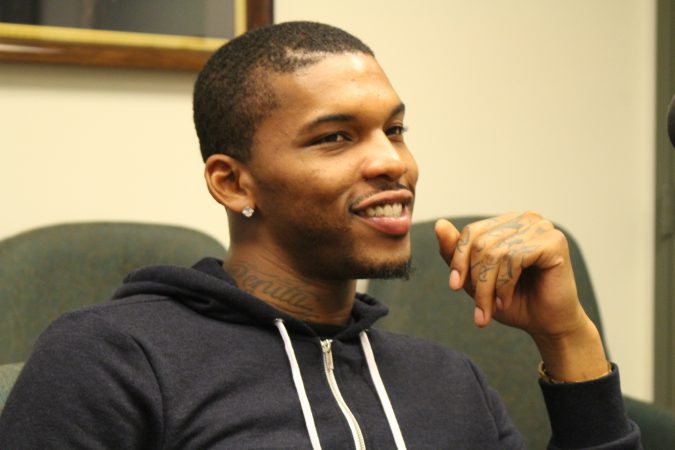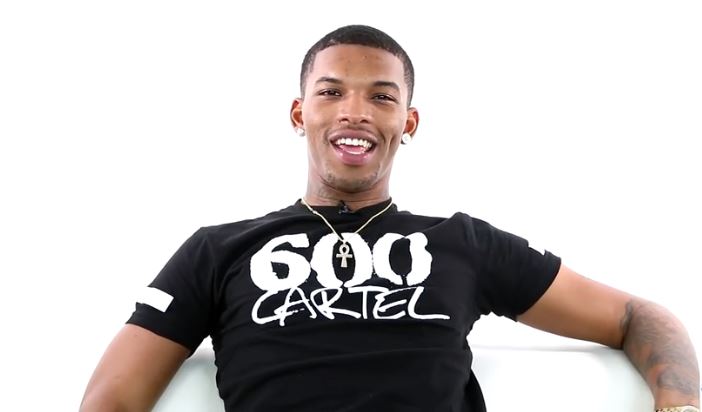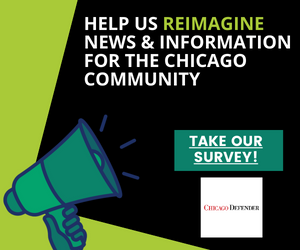The Chicago Defender’s Black Music Month Special Edition
600Breezy | @600Breezy

The industry’s highly sought-after artists in the music business are artists that come from Chicago’s roughest neighborhoods. The saving grace of music, sports and academic achievement have transformed young lives; taking them out of an environment that has fallen to unemployment, closed schools and economic disparity, the streets become their mentor.
But sometimes, the best music has to come out of the darkest places in order to see the light.
Antonio Valentino King, better known to hip hop fans as one of Chicago’s most controversial rap artists, is 600Breezy. He first broke onto the scene when one of his closest friends, LA Capone, was shot and murdered in September 2013. It triggered the Washington Park native to record and release his first single, “Don’t Get Smoked”, creating a viral frenzy accumulating 4.4 million YouTube views.
King is not one who holds his tongue and has blatantly called out artists on their lack of creative ingenuity and talent. The 24-year-old father of two is open and honest with people when discussing his gang affiliation and run-ins with the law. He doesn’t pull back, but as this star rises in the music business—working with heavy hitters such as Drake—he realizes that the weight he carries is bigger than him.
On June 2, Breezy headed back to Waterloo, Iowa for a court date in connection to a 2012 charge of drug possession. Although currently on probation, he was found to be in parole violation according to the courts. He was immediately sentenced to ten years, but on a call from jail, the Chicago native made it clear to KollegeKidd.com that he would serve one year with legal support from fellow artist, Drake.
The day before this unfortunate outcome, Breezy and his manager, Rita Lee came by The Chicago Defender for an in-depth interview—promoting his new single, “Lou Rawls” distributed through EMPIRE. He was tired from traveling but excited with the prospects of what the future held for him and his family.
 Tell us about how you got into the rap game.
Tell us about how you got into the rap game.
I knew how to rap for a long time, but I got into rap seriously when my friend LA Capone got killed. He was on his way to meet T.I., who was about to sign him. Unfortunately, he was killed the week before he had his meeting with T.I. coming out of a studio here in Chicago. You know with Chicago rap, everybody’s dissing everybody’s dead homies, so they were dissing him crazy—other rappers.
I made a song called “Don’t Get Smoked” and it was just me following in their path but I got extra disrespectful. I was disrespectful to the point where I still look at the song like ‘Damn, I didn’t have to do that.’ From there, I don’t know…I just got a bright light. I no longer continued to be disrespectful—I just made music. I’ve been in the rap game for about two and a half years and I’ve been going strong.
Do you think the buzz from rap artists like Chief Keef has played a major role on people recognizing your music?
It did play a big part with Chief Keef because he’s 300 and we’re 600. We’re all cool to the point that he used to hang on our block too. He was in our music videos and you can catch us in some of his old videos. We’re cool and we’re all friends. We all praise some of the same people who died because we all have mutual connections that definitely played a big part. After Chief Keef rolled out, it made Reese, Durk and Fredo bigger.
What do you consider ‘real’ in rap music these days?
It’s definitely beyond the glitz and glamour. I got a big opportunity with this music. I didn’t want to do it before, but now I want to do it because of the places it’s taking me. I’ve been on private jets, in mansions and around nice cars. I feed my family with the money I’m making off of it—there’s residuals coming from it. It’s not about putting on these chains to be flashy or let me get these cars or whatever—I’m using this as a way out.
Who are some of your favorite musical influences from Chicago?
I can’t even sit here and say that I know too many lyrical Chicago artists. I mean, Psycho Drama, Cap 1—it’s a few people I can name that can rap from Chicago. I don’t like the new Kanye, I like the old Kanye—College Dropout Kanye. Some Chicago artists are disappointing to me—GLC can spit. Artists need to step it up man—it’s kind of messed up that they only know Chicago for Chief Keef. I’m changing that, I’m changing that now.
Have major record companies approached you about a deal?
Labels have been coming for me since I dropped my first song. I had somebody misrepresenting me, and I lost a lot of looks, but then I kind of fell back on the rapping and came back strong. I just did my listening session for my last project in New York at Quad Studios—packed it out. I had Bad Boy, Sony Music and other people there who are interested in me. But, I’m not looking for no deal, because I’m independent. I see all of my money right now, I’m with EMPIRE through distribution. I’d rather just stay independent and just make all of my own money; like Chance the Rapper.
Are you working on new music to release similar to “Lou Rawls”?
Yes, more positive singles like “Lou Rawls” with good visions, good songs and good music. I’m working, I can’t even say what’s going to come out in the next few months because these last few months have been crazy. I never expected half of the things that’s been going on for me. To make Drake’s album, just to be on the awards with him, on private jets and riding nice cars, I’m seeing a better lifestyle. So in the next few months, somebody might want to bring me the best deal.
When everything is said and done—what matters most in your life?
My kids are number one. Everything I do, I do for them and my mom. It’s just family—family is important to me. My grandma saw me on the Billboard Awards and called me crying tears, screaming at the top of her lungs. I didn’t even win an award, I was just there but I’m her baby. Family is the most important thing to me.
Follow Mary L. Datcher on Twitter
600Breezy: He Got Game



